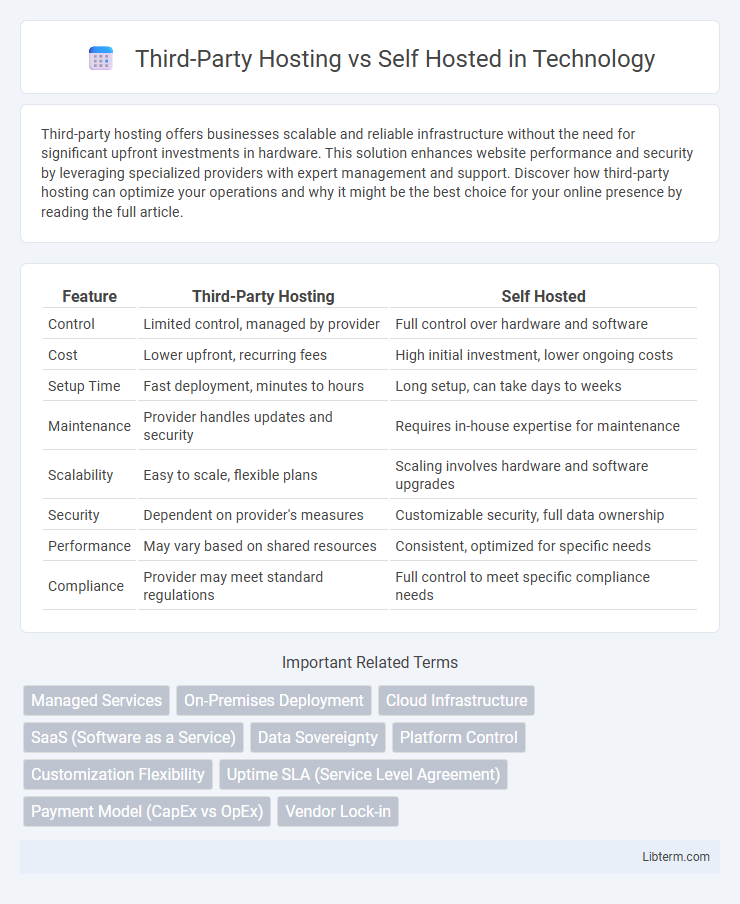Third-party hosting offers businesses scalable and reliable infrastructure without the need for significant upfront investments in hardware. This solution enhances website performance and security by leveraging specialized providers with expert management and support. Discover how third-party hosting can optimize your operations and why it might be the best choice for your online presence by reading the full article.
Table of Comparison
| Feature | Third-Party Hosting | Self Hosted |
|---|---|---|
| Control | Limited control, managed by provider | Full control over hardware and software |
| Cost | Lower upfront, recurring fees | High initial investment, lower ongoing costs |
| Setup Time | Fast deployment, minutes to hours | Long setup, can take days to weeks |
| Maintenance | Provider handles updates and security | Requires in-house expertise for maintenance |
| Scalability | Easy to scale, flexible plans | Scaling involves hardware and software upgrades |
| Security | Dependent on provider's measures | Customizable security, full data ownership |
| Performance | May vary based on shared resources | Consistent, optimized for specific needs |
| Compliance | Provider may meet standard regulations | Full control to meet specific compliance needs |
Introduction to Web Hosting: Third-Party vs Self-Hosted
Third-party hosting involves renting server space from providers like Bluehost, HostGator, or SiteGround, offering ease of use, managed security, and technical support. Self-hosted solutions require owning or leasing physical servers and handling all maintenance, providing full control, customization, and potentially lower long-term costs. Choosing between third-party and self-hosted web hosting depends on factors such as budget, technical expertise, scalability, and control over server management.
What Is Third-Party Hosting?
Third-party hosting refers to outsourcing the storage, management, and delivery of a website or application to an external service provider, such as Amazon Web Services, Google Cloud, or Bluehost. This model offers scalable resources, automated maintenance, and security managed by the hosting company, reducing the technical burden on the user. Businesses often choose third-party hosting to leverage reliable infrastructure, enhanced uptime, and global content delivery networks without investing in physical hardware.
What Does Self-Hosted Mean?
Self-hosted means managing and storing your website or application data on your own physical servers or privately owned cloud infrastructure, granting complete control over security, performance, and customization. This approach requires technical expertise to handle server maintenance, software updates, and backups, but offers greater flexibility compared to third-party hosting services. Self-hosting is ideal for businesses seeking full ownership of their digital assets and the ability to tailor their hosting environment to specific needs.
Key Differences Between Third-Party and Self-Hosted Solutions
Third-party hosting relies on external providers to manage server infrastructure, offering ease of use, automatic updates, and scalable resources, whereas self-hosted solutions give full control over hardware, software customization, and data security. Third-party platforms typically involve recurring fees and limited backend access, while self-hosted setups require higher upfront investment and technical expertise but eliminate vendor dependency. These distinctions impact cost management, security protocols, and system flexibility, crucial for businesses evaluating hosting strategies.
Advantages of Third-Party Hosting
Third-party hosting offers superior reliability with dedicated servers maintained by professionals ensuring minimal downtime and enhanced security protocols. It reduces infrastructure costs and technical management responsibilities, as the hosting provider handles updates, backups, and scalability. This option allows businesses to focus on core operations while benefiting from optimized performance and global content delivery networks (CDNs).
Benefits of Self-Hosting Your Website
Self-hosting your website offers complete control over server configurations, allowing for customized performance optimization and enhanced security protocols. It eliminates dependency on third-party providers, reducing potential downtime and ensuring direct management of data privacy and backups. Cost efficiency can improve over time with self-hosting, as there are no recurring fees tied to third-party hosting plans.
Potential Drawbacks of Third-Party Hosting
Third-party hosting can lead to limited control over server configurations and updates, potentially impacting website performance and customization options. Data security and privacy risks increase as sensitive information is managed by an external provider, which may not comply with specific regulatory standards. Dependence on the hosting company's uptime and support reliability can result in unexpected downtime and delayed issue resolution.
Self-Hosting Challenges and Limitations
Self-hosting requires significant technical expertise to manage server maintenance, security updates, and data backup, which can exceed the capabilities of many users. High upfront costs for hardware and ongoing expenses for power, cooling, and internet bandwidth present financial challenges. Limited scalability and potential downtime further hinder self-hosted solutions compared to flexible, managed third-party hosting services.
Factors to Consider When Choosing a Hosting Option
Choosing between third-party hosting and self-hosted solutions depends on factors such as budget constraints, technical expertise, scalability needs, and control requirements. Third-party hosting offers ease of use and maintenance by outsourcing server management, ideal for businesses lacking in-house IT resources. Self-hosted options provide maximum customization and security but demand substantial technical skills and upfront investment, making them suitable for organizations prioritizing full control and data privacy.
Third-Party vs Self-Hosted: Which Is Right for You?
Third-party hosting offers streamlined setup, automatic updates, and managed security, making it ideal for users seeking convenience and minimal technical maintenance. Self-hosted solutions provide full control over server configuration, customization, and data privacy, suitable for businesses with technical expertise and specific hosting requirements. Choosing between third-party and self-hosted depends on your priorities regarding ease of use, cost, control, and scalability.
Third-Party Hosting Infographic

 libterm.com
libterm.com